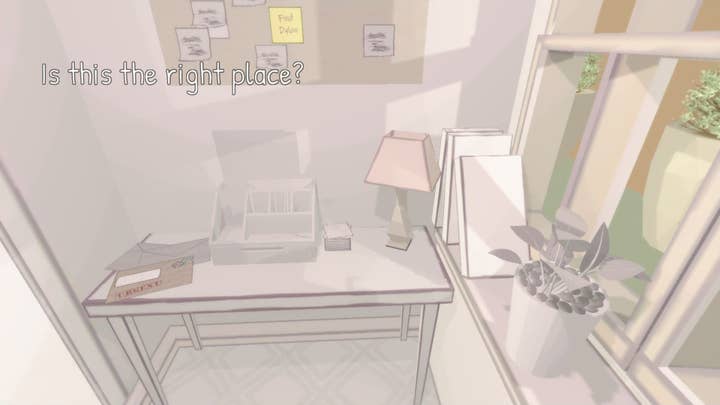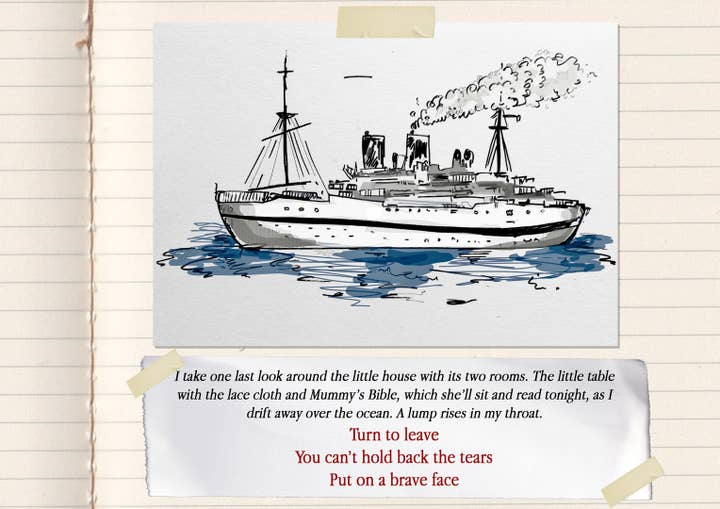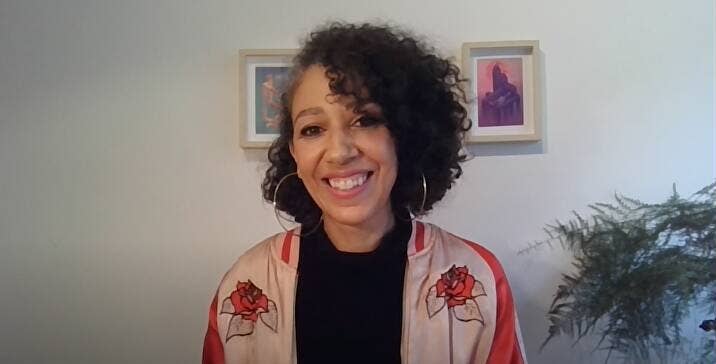Chella Ramanan’s guide to getting the most from your game-making journey
The Before I Forget writer shares how to thrive and enjoy building both indie and AAA titles, and explains key differences between writing and narrative design
One of the keynote speakers at our recent GI Academy Live was Chella Ramanan, a writer and narrative designer who has worked on a variety of different projects during her career.
Her rise to prominence as a games writer started with Before I Forget, a narrative exploration title which initially emerged from a game jam and focused on an Indian woman living with early-onset dementia.
These days she is a narrative designer at Ubisoft’s Massive studio, working on the upcoming Avatar: Frontiers of Pandora. That’s on top of her work as a narrative designer on the upcoming narrative game called Wishrush Tales, a more personal project which details the titular immigration of people from the Caribbean into the UK.
In her GI Academy talk, aimed at students and aspiring game devs, Ramanan explored the subtleties of working in narrative, and shared four key elements you should be aware of before kickstarting your career.
What is the difference between a writer and a narrative designer?
Throughout her career, Ramanan has worked as both a writer and a narrative designer. Though these might sound like interchangeable terms, they actually involve very different things.
"As a writer, you are focused on the characters and their journey through the game and the story setting," Ramanan said.
"It's not just about writing the dialogue that the characters say – there's lots of writing you do before you would get near dialogue. We will write everything from character bios to quest design documents – where you outline the plans for quests – and back story for all sorts of elements if you're working on a world that has lots of lore, like Avatar, or any IP that has canon associated with it then you'll do lots of writing around that. Primarily, you're focused on characters and their journey through the world and setting of the game."
Narrative design, meanwhile, is a more "holistic" view of a story.
"It is focused on the player experience, so the journey of the player and what the player is feeling," she explained.
"That can be different to what the player character is feeling. That's something that we learnt and examined in Before I Forget. It's also about how the story is being told. Which of the toys that you have available to you within the game you are making, which of those are you going to use to design the most compelling story beat? Which gameplay and storytelling elements are you going to employ to ensure that you are always giving the player the most engaging experience?
"The main goal is to ensure that gameplay and story support each other; the game design and pacing, all sorts of elements, work together to ensure that the gameplay supports the settings, themes and character motivations and also that happens in reverse, so the characters and the story are also supporting the goals of the game for the player and for the best player experience."

Chella Ramanan’s key skills for working in game development
The main focus of Ramanan’s talk was key lessons from her time working as a writer and narrative designer in games, going through the main aspects that anyone entering the industry should be aware of.
1. Collaboration is key
In game development – whether it is for an indie or AAA project – you will end up working with a lot of people across a wide array of disciplines. As a result, knowing how to collaborate with others is an essential skill.
"Making games is hard," Ramanan said. "People say that all the time, but it really is. It takes so many people. Even for a small game like Before I Forget, we pulled in people with different expertise like a composer, an audio designer, a voice actor director, and a 2D artist. We had to pull together a team. It's like a barn raising; all of these people are working towards this one goal and to do this one really big difficult thing.
"Everyone has to know what their role is and make sure everything is in place at the right time for this thing to be able to get up off the ground and not collapse under its own weight."
The toxic genius is a narrative that needs to go away and we can celebrate people who are extremely talented but also nice people to work with
This ties into another one of Ramanan’s bits of advice; be a nice person to work with.
"We tend to put problematic people on pedestals in the games industry," she explained. "The toxic genius is a narrative that needs to go away and we can celebrate people who are extremely talented but also nice people to work with, who support their team instead of making things difficult for them and producing great work.
"If people like working with you, they'll recommend you to other people and they'll try to work with you again because you enrich the team and the environment and don't cause undue stress or difficulties. Part of being a nice person isn't just being a smiley face or something; it's about understanding how your work impacts other teams."
She adds that being a writer working on the narrative team involves being around a lot of other disciplines as "the narrative touches so many other teams on the project."
"It could be that really cool scene that we've sorted; does the animation team have the budget for that if it's going to be a cinematic? And have we communicated the dependencies to the audio team on this specific thing? Can we even make that? It's about understanding the pressures and needs of other teams, and being okay with compromise," she continues.
"Sometimes you'll have to meet some sort of middle ground so that everybody can achieve their goals on different teams. Sometimes you won't agree with that decision and you'll mourn the loss of something that you really cared about. But ultimately everyone is just trying to get this really difficult thing done and make it the best they can so at some point you have to accept and keep moving forward."
2. Bring yourself to what you do
The second piece of advice that Ramanan had to offer was directly about how you approach your work; that in development it is okay to bring your own personal feelings, interests and passions to what you produce. This is one of the reasons why she is creating a game based on the Windrush Generation.
"If you wanted to make your own project, this is a way for you to stand out from the crowd because you are all unique," she said. "You all have unique backgrounds and interests and when it comes to finding out what those passions are and things you can bring to the project, think beyond your passion in games – that's a given.
"For instance, for me with Windrush Tales, I am a child of Windrush and I don't see myself, that background or heritage, represented hardly anywhere, never mind in games. We're the first game to cover that period of history and it comes from a personal space, so the whole team has a personal connection to it. That makes that game unique.
The team is full of unique individuals who each bring something. Make sure that you don't leave those other passions behind
"It doesn't have to be that personal. It could be you're really into loom weaving or medieval Belgium or something. You can bring aspects of that, whether it's the mechanics of it into some other aspect of the game... there are all sorts of things that I probably can't even fathom in other disciplines that can influence the way you think and approach your work."
This does vary, of course, from project to project. With a big AAA project, you might not have the freedom to put your own personal experiences into a narrative in the same way that you can with a smaller indie game. But that’s not to say you can’t inject your own interests into a blockbuster project.
"I've found that working in both indie and AAA, I don't have the freedom to go and inject a story about the Windrush Generation in an Avatar game," Ramanan said.
"But there are ways that you can let your passions inform your creative decisions, whether it's – for me as a writer – characters I write, bringing in things and themes I am interested in. I find that it's a really important way to stay engaged and passionate about the project; it helps and it just gives you that personal touch. That's why you're in the team. The team is full of unique individuals who each bring something. Make sure that you don't leave those other passions behind."

3. Show people what you are making
Feedback is important for any creative work and the same is true with video games. Ramanan says that it’s vital that you show people what you are making in order to get new perspectives and feedback.
"This was a lesson I learnt really early with Before I Forget," Ramanan admitted.
"At the game jam, we won the People's Choice Award and I'm 99% sure that Claire [Morwood, the title’s programmer, designer and artist] and I would have gone: 'It was really nice to meet you, this was fun, cool, bye, see you sometime' if we hadn't won that award and realised that people really engaged with this prototype that we had made in like 36 hours.
Within your project, you can still engage with team members from other disciplines. Don't be afraid to show your ideas
"We thought we could maybe carry on and see where this went. We couldn't help but show it to people because it was at a game jam and was being judged. We found that along the entire journey of the game; when we took the demo to shows and we got that feedback from people and when we took it to the Games Hub or to show to a friend, just showing people your work can reinvigorate you and give you energy and direction. Sometimes you'll see that people aren't responding to something that you thought they would and then you can fix that."
As with injecting your own personal experiences and passions into a narrative, how much you’ll be able to share with other people will vary depending on what kind of project you are working on.
"Within company projects that aren't your own, remember that NDAs are real," Ramanan said. "So if you have a non-disclosure agreement, do not break that. This isn't carte blanche to break NDAs. But within your project, you can still engage with team members from other disciplines. Don't be afraid to show your ideas. I know it makes you vulnerable – what if they don't like them? But what if they do like them? What if they love them? If they don't like them, then you can learn something from that, too."
4. Build community
Ramanan’s final point is the importance of community within the games industry. This is a vital way of getting feedback on what you are working on, which ultimately will make your project better in the long run.
"I know that the games industry can feel really cliquey. There are the cool people that we put on pedestals and you watch them talk to each other at events and things like that," Ramanan said.
"On the whole, you can probably go talk to them and they'll be receptive to talking to you. But it can be intimidating and I get that. They might live in San Francisco and you live in Wolverhampton. The likelihood of you being able to have a casual engagement with someone at an event is unlikely in that respect other than being 'Can you jump on a call with me?' which is difficult to ask because it is intimidating.
"But my lesson is that despite the fact the industry feels unapproachable or cliquey, Before I Forget would not have got where it is without enormous support from people in the games industry and other game devs, indies and people working at big companies as well. People were just endlessly generous with their time and knowledge and just supported us. There are so many people to thank for keeping us going, encouraging us and helping us find funding and all sorts of things with Before I Forget."
You also don’t need to rely on – or try to join – existing communities. You can just as easily build your own.
You're the ones that are going to come and bring this breath of fresh air. Build community, be kind to each other, support each other and good luck
"It's quite easy to do that if you just find like-minded people," Ramanan said. "I used to run a roleplaying group when I was making Before I Forget. I didn't want to go up to Bristol to the Games Hub, but I wanted some sort of feedback. There were games-adjacent people at the role-playing group, I knew they mucked around with some things sometimes, so I said: 'If I create a game dev thing around my dining table, would anybody be interested?' and five people said that would be really cool.
"All you need is some snacks, a table to sit around and some power points to plug in your stuff. Some people were making card games or text adventures or mucking around with a physics setup in Unity. I could share my game. You can do game jams together, you are there sharing ideas and seeing what other people are doing which will feed you and motivate you. It also gives you accountability because you know you have to show up to the dining table, not just with snacks but some bit of a game that you have made or developed."
Ramanan closed her talk by saying that people coming into the games market now have lived through a "momentous period" and that she is looking forward to seeing what the next generation does.
"You're the ones that are going to come and bring this breath of fresh air," she said. "You have lived through a momentous period; you've come through a pandemic for heaven's sake! You have fresh ideas and fresh perspectives."
She concluded: "We're all really excited to see what you are going to do. We're going to want to be hanging out with you, really, as opposed to the other way around. Build community, be kind to each other, support each other and good luck."
You can rewatch Chella Ramanan's GI Academy Live talk below:
More GamesIndustry.biz Academy guides to Working in Games
Our guides to working in games cover various perspectives, from hiring to retention, to landing the job of your dream or creating the right company culture:


